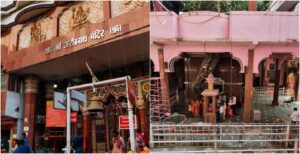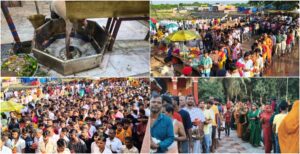BRABU VC Pioneers Nutritional Breakthrough Using Manipur’s Black Rice in Functional Dairy Products

Muzaffarpur/Patna: In a significant milestone for food science and public health, Prof Dinesh Chandra Rai, Vice Chancellor of Babasaheb Bhimrao Ambedkar Bihar University (BRABU), has led a transformative research initiative unlocking the nutritional power of Chak-Hao — a GI-tagged black rice variety from Manipur — for integration into functional dairy products.
The study, conducted at Banaras Hindu University’s Department of Dairy Science and Food Technology, has been published in the peer-reviewed Journal of Food Safety and Health (Wiley Online Library). Co-authored by Dr Saloni Rai, Prof Rai, and BHU Professor Dr Raj Kumar Duary, the research employs green extraction technologies to isolate anthocyanins, potent antioxidants, from the Chak-Hao Poireiton strain. These anthocyanins have been successfully embedded into dairy items such as low-calorie ice creams designed to support gut health, enhance immunity, and regulate blood sugar.
“Our mission was to unlock Chak-Hao’s potential using sustainable, efficient methods,” Prof Rai said. “These green technologies are a game-changer, reducing energy use and aligning with our commitment to environmental stewardship.” His team used techniques like ultrasound-assisted extraction and bead milling, achieving higher anthocyanin yields in just five minutes — significantly faster and more eco-friendly than traditional solvent extraction, which takes over three hours.
High-resolution mass spectrometry confirmed the rice’s rich bioactive profile. The project, Prof Rai said, aims not only to revolutionise health-focused food products but also to bridge the gap between rural farming and urban health needs. “Chak-Hao is a nutritional gem that can transform how we approach food and health,” he said, adding that its commercial potential could boost local economies while promoting wellness.
Prof Rai’s dual role as administrator and researcher has proved pivotal. Known for his pioneering work at BHU and BRABU, he has combined traditional agricultural wisdom with modern food science to deliver 18 high-impact publications in the past year. “This project is deeply personal to me,” he said. “It’s about honouring our agricultural heritage while creating solutions that benefit both farmers and consumers.”
His call to action was directed at both policymakers and the food industry: “Underutilised crops like Chak-Hao are a goldmine for health and sustainability. Investing in them can transform agriculture, improve public health, and ensure food security.”
The academic and alumni community, including figures such as Proctor Prof B.S. Rai, L.S. College Principal Prof Om Prakash Roy, and CA K.K. Chaudhary, lauded Prof Rai for his achievement. His vision to scale the innovation for commercial production aims to make anthocyanin-enriched dairy products a household staple, combining nutrition with sustainability.





